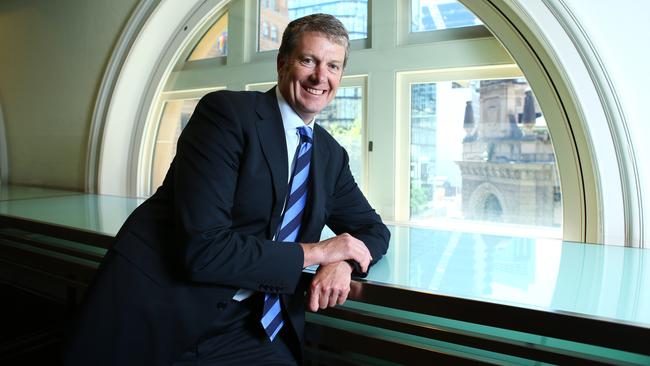BlueScope chief Paul O’Malley warns of energy ‘catastrophe’
BlueScope chief Paul O’Malley says the nation is facing an “energy catastrophe” as rising prices pressure businesses.

BlueScope Steel chief Paul O’Malley says the nation is facing an “energy catastrophe” as relentlessly rising power and gas prices put pressure on businesses, including the Port Kembla steelworks, to the extent where they could close without rapid policy changes.
The steel boss, who yesterday oversaw a strong first-half profit gain on the back of high steel prices and cost-cutting that underpinned a dividend and buyback, has called for a mandated level of coal and gas power stations.
He has also raised the prospect of gas reservation to counter Queensland LNG exports that he says may not be in the national interest.
“We’ve been trying to call this out for five years, about gas supply shortfalls, and it’s real now; we’ve been calling out issues around a lack of planning on power, and it’s real now,” Mr O’Malley told The Australian yesterday.
“We’re seeing our costs increase and our customers are telling us their costs are increasing. If it hits the point where people can’t make money then the industry will start to shut down.”
While the future could be challenging on the energy front, BlueScope yesterday revealed that it was firing on all cylinders in the first half of fiscal 2017, reporting that net profit rose 79 per cent to $359.1 million.
Underlying earnings before interest and tax rose 162 per cent to $603.6m. The company, which has a strong recent history of increasing and beating guidance, said it was forecasting second-half EBIT of $540m, beating analysts’ expectations.
Indicating it would focus on incremental growth and running the newly healthy business, rather than big acquisitions, BlueScope declared a 4c a share, fully franked interim dividend and announced a $150m on-market share buyback.
After years in the doldrums, Melbourne-based BlueScope is going from strength to strength. This is thanks to a 2015 restructure of the Port Kembla steelworks that slashed costs (with government and union help), a well-timed buyout of its 50 per cent partner in the North Star steel mill in Ohio, and recent strengths in global steel prices driven by Chinese demand and a slowing of exports from the Asian powerhouse.
Yesterday, BlueScope shares rose 49c, or 4 per cent, to a fresh seven-year high of $12.68, leaving it with a market value of $7.3 billion. The stock is up 37 per cent so far in 2017 and 131 per cent since this time last year.
Mr O’Malley will reach 10 years in the top job in November, but said yesterday he had no plans to retire.
Australia is still the biggest earner for BlueScope, which has been diversifying geographically under Mr O’Malley. When he started in 2007, Australia made up 70 per cent of pre-tax earnings. This is now down to 43 per cent.
The increased warnings of a looming energy crisis come in the wake of South Australian blackouts, and a separate power outage that cut two-thirds of capacity at the Portland aluminium smelter in Victoria.
Mr O’Malley said problems at Portland and Whyalla blast furnaces and Nyrstar lead smelter in South Australia were a warning for Port Kembla.
“For us to reline a blast furnace in 10 to 15 years, we have to start putting money in the bank now,” Mr O’Malley said. “If all that money is eaten up by increasing power costs or if there is a shortfall of energy and we get told to curtail power to our blast furnace, it could happen more quickly.
“We’re endeavouring to make sure we get a policy response before it becomes a crisis in real time.”
Mr O’Malley said gas was a cleaner alternative to fuel as coal was phased out, but that what was available was being “hoovered up and sent overseas”, resulting in price increases and potential shortages.
“If there is gas in Australia and we say it can go overseas, and we don’t have any baseload generation, I think we are going to have an energy catastrophe in Australia,” he said.
Mr O’Malley said the current review being undertaken by chief scientist Alan Finkel was the best chance in a decade to have a conversation about tackling the nation’s growing energy problems. “We need a baseload energy target on every side of every interconnector in the country,” he said. “There needs to be a set number of coal and baseload or peaking gas units, then we can add in as much renewables as we need, but that system needs to be as stable as possible so when the wind or sun stops the grid doesn’t fall.”
Mr O’Malley said no one was talking about the extent that power prices were rising. “The hip pocket cost to industry, large and small and to consumers is going to be substantial,” he said.
He said too many LNG export trains had been built at Gladstone at too a high a cost and that, while reservation was a “dirty word” in Australia, there needed to be a policy that recognised the nation needed affordable gas.
“Many people argue that (Queensland LNG export) is a great thing but I query whether increasing the energy cost to all businesses in Australia is actually in the national interest,” he said. “Price increases are running out of control because there is not a policy to ensure competitiveness of supply and competitiveness among suppliers.”
He said gas exports were necessary but balance was needed. “We have to get the mix right with the amount of gas we need to ensure a competitive economy and the amount of gas needed by people in Queensland to export,” Mr O’Malley said.




To join the conversation, please log in. Don't have an account? Register
Join the conversation, you are commenting as Logout